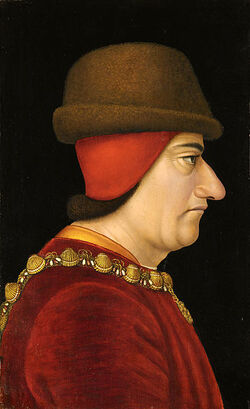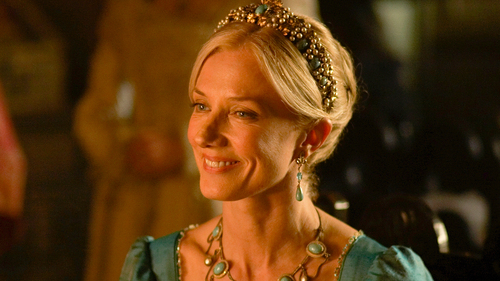-
Today in Tudor History...
28 August 1481 – Death of Afonso V of Portugal
1521 – The Ottoman Turks occupy Belgrade.
1524 – The Kaqchikel Maya rebel against their former Spanish allies during the Spanish conquest of Guatemala.
1542 – Turkish–Portuguese War (1538–1557): Battle of Wofla: The Portuguese are scattered, their leader Christovão da Gama is captured and later executed.
1565 – Pedro Menéndez de Avilés sights land near St. Augustine, Florida and founds the oldest continuously occupied European-established city in the continental United States.
1592 – Birth of George Villiers, 1st Duke of Buckingham, English politician, Lord Lieutenant of Buckinghamshire
1609 – Henry Hudson discovers Delaware Bay.
1619 – Ferdinand II is elected emperor of the Holy Roman Empire.
29 August 1442 – Death of John VI, Duke of Brittany
1475 – The Treaty of Picquigny ends a brief war between the kingdoms of France and England.
The Treaty of Picquigny was a peace treaty negotiated on 29 August 1475 between the Kingdom of England and the Kingdom of France. It followed from an invasion of France by Edward IV of England in alliance with Burgundy and Brittany. It left Louis XI of France free to deal with the threat posed by Charles the Bold, Duke of Burgundy.


1484 – Pope Innocent VIII succeeds Pope Sixtus IV.
1498 – Vasco da Gama decides to depart Calicut and return to Kingdom of Portugal.
1521 – The Ottoman Turks capture Nándorfehérvár
1526 – Death of Louis II of Hungary
1529-Papal breve suspending the further hearing of the King's cause till Christmas. Rome, 29 Aug. 1529.

1533 – Spaniard Francisco Pizarro executes Atahualpa, the last Sapa Inca (sovereign emperor) of the Inca Empire.
1534-Chapuys to Charles V.
I suppose your majesty has been fully informed of the success of the revolt of young Kildare; nevertheless I may mention a few particulars. According to the rumor in Court, he has now at his devotion all or nearly all the lords that the King used to have in Ireland, unless it be the earl of Ossory (Dansrey), whom for some reason he will not yet press, and the grand prior of St. John's. He has given order, on pain of death, that all the English shall leave the country in a certain time. Those of the towns where he has entered have sworn fealty to the Pope, to your majesty and to him: the rest of the towns, where he had not yet been, were summoned to do the like, and it is expected they will without further pressure. All the English fishermen that he can lay hands on he puts to death, to frighten the others from coming there, knowing the great importance to the English of the fishery of that coast, which is of such importance that those of Cornwall, as I am told, would rather lose their tin mines than the right of the said fishery. The report is also common that there is an ambassador of your majesty in Ireland, about which I have been much questioned, and have said I did not know, and that if it were so, it might be to remedy some new attempt of the Irish against the Spaniards there. From the presumption above mentioned that your majesty has better information, I have not inquired of these news very minutely, but I will keep the subject in view. The King has been trying to dissemble matters, both, as I suspect, for fear this people should take example from the others, and also in the hope of setting things right by gentleness, promising Kildare the deliverance of his father and himself, pardon both for the archbishop's murder and for all the rest; but he refuses all amity. The King, therefore, within the last five or six days has ordered his Council and some other persons to come to him at 40 miles from here to consider of a remedy, and I am told this morning that he has ordered six vessels to be got ready, and was going to send 12,000 men thither under the charge of Suffolk or of my lord Felix, governor of Wales, although some think, whatever those here pretend, they will scarcely send thither this winter, for it is already late in the season, and it will require a long time to gather the said number of men, who will not readily go where there is nothing to be got but blows; and, moreover, if Kildare held as much as they say he does, they will require to send three times the number, and lay in an enormous store of victuals, which cannot be done all at once. It is inconceivable how people are delighted at the success of these affairs in Ireland, thinking it a very good beginning to remedy matters here. Still less can you imagine their anxiety lest your majesty should lose so good an opportunity. Every day I am importuned to write to you about it from innumerable quarters, and am assured that on the least rising got up by your majesty the whole realm would declare in your favor. This was again declared to me yesterday by a good and virtuous lord, who though he was very ill, sent to me to beg that I would meet him in the fields as if by accident, which I did; and he told me that eight days since Cromwell, among other matters, said to him it was folly to fear that your majesty would attempt war, for neither Flanders nor Spain would ever consent to it, for fear of their trade, or, if that did not serve, the death of the Queen and Princess would put an end to all disputes. You will thus see that their aim is to get rid of these ladies. I therefore answered, in order that he might show it to Cromwell, what I had once told the King himself, that if the said ladies were to die, your majesty would have a still more righteous quarrel than now, which reasons the said lord was very glad to hear, that he might use them to Cromwell and others. The same language that Cromwell used about the death of the said ladies, the earl of Wiltshire also used lately to one who told him that your majesty might be angry at their illtreatment. Some fear that in the coming parliament, which will reassemble in November, the King will get them to declare the Queen and Princess to have incurred the penalty in the statute made against them, so as to have grounds for treating them still worse.
The Princess, understanding of late that the King intended she should remove and accompany the Bastard, sent to me three times in less than 24 hours to know what to do. I wrote back to her each time resolving her seruples that even if she did obey the King without opposition or protestation, all that the King desired in the respect could do no prejudice to the protestations already made. Nevertheless I thought that, to prevent her father and his lady imagining she was worn-out and conquered by illtreatment, she should speak boldly and with her accustomed modesty, but not go to the extremity of allowing herself to be taken by force, as on the former occasion. I wrote to her at full length what she ought to say; not that it was necessary, considering her good sense, but because she desired me. She played her part so well, that the Comptroller promised her she should not go after the other. Nevertheless, on her coming to the first door of the lodging there was the litter of the Bastard, and the Princess was compelled to go out after her, the Comptroller allowing her, as soon as she mounted, to go before or after, as she pleased; on which account she suddenly pushed forward, and arrived at Greenwich about an hour before the Bastard. When she came to enter the barge, she took care to secure the most honorable place. I had intimated to her that I would go to Greenwich to see her pass; and she sent to beg me to do so as earnestly as she could. I was there accordingly in disguise; and it was a great pleasure to see such excellent beauty accompanied by heroic bearing, which all the more increased the pity to see her so treated.
The ambassadors of Lubeck, I understand, are very weary at being kept here so long, and say plainly that if they had known it they would not have come on any account. They expected to have obtained a loan of money from the King for their war with Denmark, which the King offered to give provided the Easterlings would make it their own debt. But this has not been agreed to; and I expect they will get no money. The courier who, as I lately wrote, had left for Rome, finding in the French Court that the Pope was not dead, went no further. Gregory de Casal stayed at the said Court for the same reason, and I think will go straight to Venice, to reside there as the King's ambassador, and his brother, who was there, will go to the Waywode, by whose means some think this king will intrigue with the Turk if he can, to your prejudice.
All the Observants of this kingdom have been driven out of their monasteries for refusing the oath against the Holy See, and have been distributed in several monasteries, where they are locked up in chains and worse treated than they could be in prison. London, 29 Aug. 1534.
1538 - Arrest of Geoffrey Pole on suspicion of being in contact with his brother, Cardinal Reginald Pole.
1541 – The Ottoman Turks capture Buda, the capital of the Hungarian Kingdom.
30 August 1464 – Pope Paul II succeeds Pope Pius II as the 211th pope.
1483 –Death of Louis XI of France

1525-The Treaty of the More was concluded on 30 August 1525 between Henry VIII of England and the interim French government of Louise of Savoy. It was celebrated by Henry and the French ambassadors at The More, Hertfordshire, a castle owned by Henry's chief minister, Cardinal Wolsey.
England, with Wolsey negotiating, agreed to give up some territorial claims on France, receiving in return a pension from the French of £20,000 a year. France settled what was owed to Henry VIII's sister, Mary, dowager queen of France. England also agreed to work to secure the release of King Francis of France, then held prisoner by Charles V, Holy Roman Emperor and King of Spain.
England had been troubled by the threat of a renewal of the "Auld Alliance" between France and Scotland, and France agreed to prevent the Scottish Duke of Albany from returning to Scotland.

1548-Birth of Mary Seymour.She was the only daughter of Thomas Seymour, Baron Seymour of Sudeley, and Catherine Parr, widow of Henry VIII of England. Although Katherine was married four times, Mary was her only child. Complications from Mary's birth would claim the life of her mother on 5 September 1548, and her father was executed less than a year later for treason against Edward VI.In 1549, the Parliament of England passed an Act removing the attainder placed on her father from Mary, but his lands remained property of the Crown.As her mother's wealth was left entirely to her father and later confiscated by the Crown, Mary was left a destitute orphan in the care of Katherine Willoughby, Duchess of Suffolk, who appears to have resented this imposition.After 1550 Mary disappears from historical record completely, and no claim was ever made on her father's meager estate, leading to the conclusion that she did not live past the age of two.

1580 –Death of Emmanuel Philibert, Duke of Savoy
31 August 1422 – King Henry V of England dies of dysentery while in France. His son, Henry VI becomes King of England at the age of 9 months.
1422 – Death of Henry V of England
source:http://www.onthisdayintudorhistory.com/,wikipedia,http://www.british-history.ac.uk/
